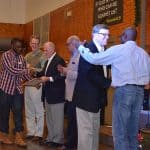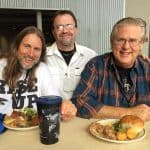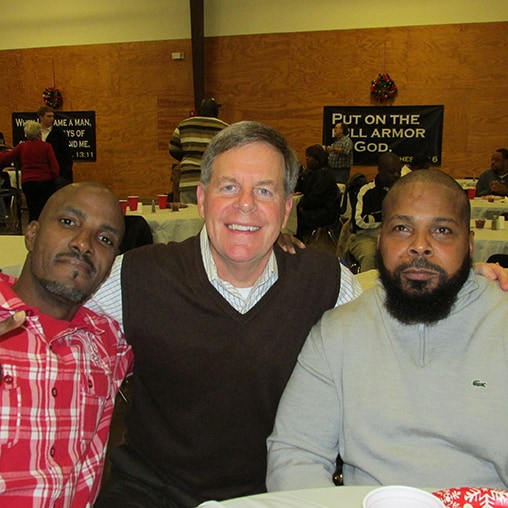
Help for the Homeless
Is God calling you to use your skills for His purposes? Businessman Jim Reese and Pastor Ricky Hall tell how the Lord recalibrated their desires and lead them to the Atlanta Mission in Atlanta, GA. Hear them share how God is using them beyond their wildest dreams to give help and hope to hopeless men.
Show Notes
About the Host
About the Guest
-
Is God calling you to use your skills for His purposes? Businessman Jim Reese and Pastor Ricky Hall tell how the Lord recalibrated their desires and lead them to the Atlanta Mission in Atlanta, GA. Hear them share how God is using them beyond their wildest dreams to give help and hope to hopeless men.
-
Dave and Ann Wilson
Dave and Ann Wilson are hosts of FamilyLife Today®, FamilyLife’s nationally-syndicated radio program. Dave and Ann have been married for more than 38 years and have spent the last 33 teaching and mentoring couples and parents across the country. They have been featured speakers at FamilyLife’s Weekend to Remember® marriage getaway since 1993 and have also hosted their own marriage conferences across the country. Cofounders of Kensington Church—a national, multicampus church that hosts more than 14,000 visitors every weekend—the Wilsons are the creative force behind DVD teaching series Rock Your Marriage and The Survival Guide To Parenting, as well as authors of the recently released book Vertical Marriage (Zondervan, 2019). Dave is a graduate of the International School of Theology, where he received a Master of Divinity degree. A Ball State University Hall of Fame quarterback, Dave served the Detroit Lions as chaplain for 33 years. Ann attended the University of Kentucky. She has been active alongside Dave in ministry as a speaker, writer, small-group leader, and mentor to countless wives of professional athletes. The Wilsons live in the Detroit area. They have three grown sons, CJ, Austin, and Cody, three daughters-in-law, and a growing number of grandchildren.
-
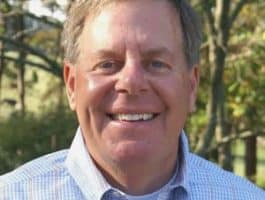
Jim Reese
Jim is President and CEO of Atlanta Mission, headquartered in Atlanta, Georgia. He joined the organization in August 2008. His primary focus is to ensure that Atlanta Mission achieves its vision, “To be the premiere service provider unifying organizational and community efforts to positively change lives through a continuum of programs focused on helping poor and homeless men, women and children in the greater Atlanta area.” Before joining Atlanta Mission, Reese held the following key bus...more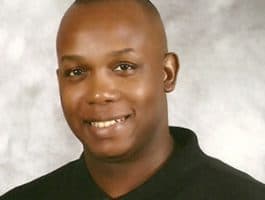
Ricky Hall
Ricky first came to Atlanta Mission in 2010 as a Counselor Intern at The Potter’s House, but he quickly demonstrated an enormous amount of talent and leadership skills. In less than 2 years, he was promoted to full-time Counselor and became a spiritual role model for the residents and staff. Ricky is a licensed and ordained minister that has served churches in Alabama, Mississippi and Georgia for over 20 years. He received his education at the University of Alabama at Birmingham and Berean Sch...more
Jim Reese and Ricky Hall tell how the Lord recalibrated their desires and lead them to the Atlanta Mission. Now, God is using them beyond their wildest dreams to give help and hope to hopeless men.
Bob: After a full career, working with Fortune 500 companies, Jim Reese was facing an option he never expected to face—going to work as the director of a ministry working with homeless people.
Jim: You know, I never really had God speak to me before; but I felt like the three things He said to me [were]: “I want you to really be fully dependent upon Me,”—which I intellectually understand—but it is easy preaching / hard living. Two, I’d spent my whole life building great teams in organizations—I thought, “Gosh, if I could go do that to the least of these—Lord, would that be great!” Then, third—which really goes to our belief—I can still remember coming home that Thursday morning and saying to my wife, “I think this is God’s call for us.” And so, we came.
Bob: This is FamilyLife Today for Monday, May 18th. Our host is the President of FamilyLife®, Dennis Rainey, and I’m Bob Lepine. Jim Reese and Ricky Hall join us today.
1:00
We’ll hear about how God moved their hearts for the homeless. Stay tuned.
And welcome to FamilyLife Today. Thanks for joining us. When you put together the Stepping Up® video series, you never imagined that you’d wind up in prison and having dinner with the homeless; did you?
Dennis: Well, first of all, I wrote the book, Stepping Up—you put together the video series. [Laughter] So, the question is better asked of you, Bob: “When you put together the video series called Stepping Up: A Call to Courageous Manhood, did you ever—did you ever think it would be used among prisoners or homeless men?”
Bob: Let’s be honest. Neither of us had any idea that that’s how God might use this tool. In fact, that was not whom we had in mind. We just had guys in mind, and we knew that there are some common things that guys are wrestling with. It doesn’t matter whether they are in boardrooms or whether they don’t have a bedroom; right?
2:00
Dennis: Yes, and we’ve got a couple of warriors from the frontlines of homeless missions. Ricky Hall and Jim Reese join us on FamilyLife Today. Jim, Ricky, welcome to the broadcast.
Ricky: Thank you, Dennis.
Jim: Great to be here.
Ricky: It is great to be here.
Dennis: I’ve been to your place. So, we’ve got you on our home turf now behind a microphone. I’ve been looking forward to chatting with you. Ricky heads up the Spiritual Life of the Atlanta Mission in Atlanta, Georgia, of course; and Jim Reese is the CEO and President of Atlanta Mission.
Bob: And you said you’ve been to their place. Tell our listeners about how you wound up at their place.
Dennis: Oh, but, Bob, that’s kind of getting to the heart of the story! I’ll give our listeners just a little taste. I was invited by a good friend of mine, Crawford Loritts, who twisted my arm and said, “You must meet Jim Reese.” He said, “Dennis, they just took a group of homeless men through Stepping Up”—
3:00
Bob: The video series.
Dennis: —the ten-part series—“and they want to invite you to come over there and speak at the graduation.” Little did I know that, not only would I have the privilege of going, but that it would be such a delightful eye-opening experience to participate with these men in their ministry.
And Jim, what I want to do—kind of before we get to that story—I just want to talk about who you are / where you came from—and you as well, Ricky—but take us back to when you were a child. You had an interesting start as a boy.
Jim: Yes, you know, Dennis, for me, my mom—I’m the oldest of three boys. When I was five years old, my dad left my mom. My mom was a waitress. There were two of us boys that she could still take care of. My youngest brother—she actually had my aunt and uncle take care of. A couple of years later, she would marry who would be my stepdad; and they would be married the rest of their lives. My mom would be an alcoholic—
4:00
—and not a very functional family. But a call—I’m not sure how—but the Lord had placed on my life, at a young age, Dennis—but it was interesting in my house.
Bob: Was there anything going on spiritually in your home as you were growing up?
Jim: You know, on my mom’s side, there were people who were, really, I would say, strong spiritually. My stepdad was Catholic. We never went to church. We actually lived in a house that was owned by missionaries. The interesting part of that was—when they came back to visit every few years, they had a boy that was about my age. We would hit it off, and we went to church camp. We lived next to people who went to a church—really an evangelical church—and they would take us to that in the summer. And that had an impact on me.
Bob: The spiritual turning point in your life happened one night when you were looking at the moon; is that right?
Jim: Yes, when I was a little boy—I was about eight years old, Bob. It was—again, our family situation wasn’t great. It was really bad, and there was a full moon.
5:00
I looked out the window. It was like the Lord looked down and said to me, “I really have a plan for you, Jim,”—I’ll never forget it.
Dennis: He just impressed you that—
Jim: “It’s going to be okay. I’m going to be with you. I’ve got a plan,”—because I didn’t feel, based on the house I was growing up in, that you could have a plan.
Bob: You were pretty successful in the marketplace; right?
Jim: Very successful in the marketplace. I started with Post® Cereals/General Foods in Battle Creek, Michigan. I spent eight years there—I went to school, eight years, at night. I finished my college degree, going to school, while I worked full-time.
We spent a couple years in New York, where my oldest daughter was born—still with General Foods. Six years in Jacksonville, Florida, where I actually ran the world’s largest coffee plant—Maxwell’s Coffee in Jacksonville, Florida. My other two daughters were born there. And then, we moved, about 23/24 years ago, to Atlanta, where I became Vice President of all operations for Frito Lay® South Division.
Dennis: Well, in a moment, I’m going to ask you to answer a question that I love to ask men.
6:00
You know about this question because it’s the way the Stepping Up series begins; but I don’t want you to answer it right now.
Jim: Right.
Dennis: That question is—go ahead, you can ask yourself.
Jim: “What’s the most courageous thing you’ve ever done?”
Dennis: Yes.
Jim: Right, Dennis?
Dennis: “What’s the most courageous thing you’ve ever done?”
But I want to turn to you, Ricky, and get your story. Take us back to your home. Did you grow up in a Christian family?
Ricky: Indeed, I did. I was tremendously blessed. Being an African American, I know it’s been chronicled, through the news media, about the lack of the father in the home. The Lord blessed me not to have to deal with it. My dad has been one of the greatest men in my life—one of the greatest men I’ve ever known now.
The way God works, as only He can—my dad didn’t grow up with his father. He became the man of his house at nine years old. That boy—that impact on his life was so great that he purposed that: “If God blesses me with a family, I’m going to do everything I can to be a man in my boys’ lives; and I’ll take care of my wife.”
7:00
My parents have been married nearly 60 years! I speak to my father every single day to this point. Now, I’m not 16 years old; but I need him just as much now, heading into my 50s, as I did when I was 16.
Bob: When you were growing up in Birmingham, it was a period where there was racial tension; wasn’t it?
Ricky: Indeed. My father really lived in the midst of those times and told me many powerful stories. God sovereignly used those experiences to help forge a faith in him—that he was more focused upon God and never taught us any racial division.
The Lord blessed me that I eventually went into ministry, after a period of really questioning that and running that.
8:00
I went to school and studied journalism and sociology and was headed towards being a reporter. I was in college, working for my local newspaper, and sitting in the newsroom on Sunday. There was an image of guy on TV—it was a newscaster. Of course, I don’t have anything against what that profession is—but I turned and looked at the TV screen—and I felt the Spirit of the Lord impress me and tell me: “There’s nothing that that person is doing, right now, that’s making an impact in eternity. So, what are you going to do?” At that moment, I felt like God was showing me where I was going to be in 20 years if I didn’t follow Him.
And so, at that point, I knew I couldn’t keep on the path that I was on. Now, I didn’t know where I was headed; but I knew, at that point, God had called me.
9:00
I’ve been knowing that my whole life and just was running. At that point, I said, “God, I’m not going to run anymore.” That would eventually lead me to the mission field in Africa, where I have served for a number of years, leading short-term mission trips. The Lord has always given me a heart for the poor and the needy. I had no idea I would end up here. I planted a church—helped plant churches overseas.
So, long story short—God has uniquely positioned me in this place, at this time, and connected me with Jim. We kind of joke sometimes how God would bring our paths together “for such a time as this,”—me, being African American, and Jim having a heart that he has for the Lord—it just seems like it’s a great, great fit for me to be a part of the mission.
Bob: We should probably make the long story a little longer because as you described it—
10:00
—missionary in Africa / lots of experience—Jim, you are in corporate America, heading up. You both wind up at the Atlanta Homeless Mission; right? [Laughter]
Jim: Right.
Dennis: Now, here’s my question—I want to find out what Ricky’s most courageous thing he’s ever done.
Ricky: I had planted a church in Athens, Georgia, and had been a pastor for eight years. As part of my work with the church, we had an outreach to the Potter’s House in Jefferson, Georgia, which is a part of the Atlanta Mission. We picked up guys for services. I actually had volunteered with the mission and did chapel services at the Potter’s House for about eight years.
The Lord opened a door because of some mission work—that I was asked to take position as a counselor. I tried to continue to balance being a counselor, and being a dad, and being a husband, and leading a church.
11:00
It was just very difficult.
So, to answer that question, the most courageous thing that I feel I have ever done is—I prayed and felt like God had led me to step down from the church that I planted so I could come, full time, to help men who needed some guidance. Little did I know—and as we know, how ministry works—sometimes, we think we are going to help other people. Really, God is putting us in the position for us to be helped ourselves.
Bob: So, unpack that a little bit. How has that happened for you?
Ricky: My brother, who has just recently passed away, had estranged himself from our family. My dad’s a godly man / my mom—a Christian woman—but it was one of those dysfunctional parts of our family that was kind of private and secret for a long time. I’d seen him cause my parents great pain.
12:00
In all honesty, I took offense and resentment toward him.
Even in the ministry, I did not like my brother. That resentment and that unforgiveness—it affected me in a very negative way. I felt like it hurt my relationship with my wife, at times / with my son. Honestly, in helping other people, that was the one spot that I needed help—and I couldn’t see it. When I went to work at the Potter’s House, and started helping alcoholics and addicts with issues of unforgiveness, God healed me at the Potter’s House.
Dennis: You forgave your brother?
Ricky: I forgave him, and God restored my heart. Now, my brother didn’t change; but I changed. I began to love him. I began to love his family and reach out to them.
13:00
What the Lord did was—through me being able to be healed of that unforgiveness, it allowed me to really have a greater impact in the ministry to our men. Sharing that story has been a great, great impact in my ability to relate to our guys and what they go through.
Dennis: One of the things we don’t realize is—when we have not forgiven someone, it is not them—the person we haven’t forgiven—who is in prison. It’s us.
Ricky: That is so true.
Dennis: So, when you forgive them, it’s you who gets set free.
Ricky: Amen.
Dennis: Jim, I’m coming around to you. I gave you plenty of time to think this through. What’s the most courageous thing you’ve ever done?
Jim: You know, Dennis, I think, for me, it was the decision when I really did decide to come to the mission—I didn’t expect it. You know, I had left the business world—I had all my friends in business saying: “God’s given you an incredible platform in business. Why would you leave that?”
Dennis: Let’s talk about that platform for a moment.
14:00
You were Regional Vice President or National?
Jim: I was CEO of Randstad on their executive board—so, third largest staffing company in the world.
Dennis: Fifty-three thousand employees.
Jim: Yes.
Dennis: Pretty good-sized operation.
Jim: Yes, I ran US, UK, and Canada, and had global responsibility.
Bob: So, what made you even think, “Maybe, I ought to think about this mission”?
Jim: Well, I had left the business world in ’05. I was trying to sort through, “God, what do You want to do?” It wasn’t that I felt like I needed to leave business to go into ministry—I just really wasn’t sure, to be honest with you. And then, about two-and-a-half years later, I’d spent about ten months off—lost both parents during that period of time.
The guy who had recruited me to Frito Lay, earlier, called me and said: “I think I’ve got a great opportunity for you for the Atlanta”—at that point—“Atlanta Union Mission to be President/CEO—that would use your faith and your skills really well. What do you know about it?” I said, “Nothing”; and I knew nothing.
15:00
I mean, the last thing in my mind was that I would ever do urban inner-city ministry to anybody.
As I walked through that with my family—obviously, enormous change for my family / three daughters and my wife—and the men that I’d been with and my closest friends—I felt God was really telling me three things. I’ve never had Him speak to me before—but I felt like the three things He said to me [were]: “I want you to really be fully dependent upon Me,”—which I intellectually understand—but it is easy preaching / hard living. Two, I’d spent my whole life building great teams in organizations—I thought, “Gosh, if I could go do that to the least of these—Lord, would that be great!” And then, third—which really goes to our belief—and I—[emotion in voice] sorry, I just—
Dennis: You get emotional about it?
Jim: [Emotion in voice] Yes. And I can still remember the board had unbelievable faith. They were talking to pastors, and guys from the missions, and this crazy guy, who had been a CEO of a large company.
16:00
I remember coming home that Thursday morning, after being with some of the men—after we’d had a lot of prayer—and saying to my wife, “I think this is God’s call for us.” So, we came. I just pray, Dennis, honestly, that I would have near the impact that it’s had on me.
Dennis: And when you say that—back to the question Bob asked Ricky—unpack that.
Jim: I think it’s given me a whole perspective of how much God really loves everybody. You know, the whole racial reconciliation question—that’s been dear to my heart since ’93 and Promise Keepers—God’s given me an opportunity to do that in a different way than I would have ever expected. But I think to really be able to have friends that I would have never expected to be my friends who are some of the closest friends in my life. And to get up every day and really believe God’s given us an opportunity and a privilege to show Him to people who I absolutely believe could change the world.
17:00
It’s dramatically made me better appreciate the poor. It’s made me think about things, that I thought were important, that have no importance to me today—and I know how important those were to me—and so, to let those go—I mean, this is a crazy story.
But you know, I think I was at the mission about 18 months—and over my career, I loved to play golf. Every place I’d go, I’d buy a golf hat. Well, they are about $25 each; and I looked at my closet—I had about 40. I thought: “Oh, my gosh! What kind of steward were you, Jim?—40 hats that you never wore.” And I’ve got guys that would die for one! You know, I had plenty of other things God could convict me on besides golf hats; but that happened to be the one.
I think it just—for me, it’s been the incredible privilege to serve and watch God change two lives.
18:00
He is in the multiplication business.
Bob: It’s had an impact on your own marriage and family too; hasn’t it?
Jim: You know, my whole family, as I shared, was pretty dysfunctional. In fact, my youngest brother—when both my parents died in ’05, he just kind of really disappeared a lot—went across the country. About three years ago, my middle brother had found him and said, if he’d come to his house, he would give him a chance to restart.
He was going through Atlanta. Bob, my wife, paying close attention to details better than me—said: “Hey, he’s going to be in Atlanta for four hours on the bus. Why don’t you—maybe you can go see him.” So, I went and had breakfast with him, and shared with him what I was doing, and drove by and asked him how he was doing—because I really hardly knew him. And he shares that he has a drinking problem and binge drinks—which, then, I know—based upon all the people I serve—he’s got a serious drinking problem.
I really asked him where his relationship with Christ was. He had said, “Well, I accepted Him when I was young,” which I knew was really probably not the answer. And I told him he had no hope without that.
19:00
So, he left that, and got on the bus and left. That night, he called and said, “Jim, I think I need more help.” And I had mentioned to him, when we were together—totally in passing, not even more than a sentence—that if he needed more help, we had a place called the Potter’s House—didn’t think anything of it.
So, he calls me that night. He says, “You know, I think I need more help.” And he says, “I haven’t been able to get the Potter’s House out of my mind all day!” I’m immediately defensive, as a brother. I’m saying: “You know, it’s not going to be easy. Just because I’m in charge, don’t think that—it’s really going to be hard. You better go look at the website, and take the next 24 hours and pray, and call me back.” Then, he said to me, “What if, Jim, God took you out of the business world because He knew I’d need this?”
Dennis: Oh. Wow!
Jim: And I was taken aback. Then, 24 hours later, I talked to him; and he came. He went through our program, and his life’s been transformed. He’d been at the Potter’s House for probably ten days, and I got up and gave chapel.
20:00
Who’s out in about row12 / halfway to the left, but my younger brother?— hearing me share the gospel.
Dennis: Well, you know, Aleksandr Solzhenitsyn made a statement: “There are two kinds of problems—those that are far away and those that are near.” When we go near the poor, the orphan, the brokenhearted, we may think we’re the one that is going to provide help; when, as we give our lives away, God comes and meets us in very specific ways and gives back to us in innumerable ways.
I know there is more to this story, Bob, that we’ve got to tell; but I’ll just give them a little bit of a hint—God used Jim and Ricky to take 130 homeless men through Stepping Up.
Bob: Yes, I’m just sitting here, thinking about the fact that God used our listeners, as well, in this story—
21:00
—a lot of them—because some of our listeners, who support FamilyLife Today, had a hand in making the Stepping Up video series possible. We’re going to hear about how God used Jim and Ricky to take 130 guys at the Atlanta Mission through this series and about the impact that the series had on their lives.
But I think it’s appropriate, for us here, to take a minute and say, “Thanks,” to our Legacy Partners / “Thanks,” to our supporters—the folks who make FamilyLife Today possible through their financial support. The resources we produce, this daily radio program, our website—all that we do is made possible because of folks, like you, who donate to support this ministry. We’re grateful for the part you play in helping make all of this happen.
And we’ve got a video on our website, at FamilyLifeToday.com, if you’d like a little glimpse of what happened at the Atlanta Mission as these guys went through the Stepping Up material. Go to FamilyLifeToday.com. Click the link that says, “GO DEEPER.”
22:00
The video link is available right there. There is also information about the Stepping Up ten-week video series. It may be that you’d like to take a group of guys through this material—maybe, it’s a group of guys you know or, maybe, it’s an outreach opportunity at a place like the Atlanta Mission in your community.
Find out more about Stepping Up, the video series, when you go to FamilyLifeToday.com. Click the link that says, “GO DEEPER,” in the upper left-hand corner of the page. The information about the Stepping Up series is available there. In fact, you can watch a few clips from the series if you’d like to take a look at what the Stepping Up series looks like. Again, the website: FamilyLifeToday.com. If you have any questions about the video series, call: 1-800-“F” as in family, “L” as life, and then, the word, “TODAY.” We can answer any questions you have and get you resources you may need.
Let me also mention that right now is a particularly good time—if you’ve thought about helping to support the ministry of FamilyLife Today—
23:00
—when you make a donation today, your donation’s impact is going to be doubled. We’ve had some friends of the ministry who have come alongside us. They have agreed, this month, they will match every donation we receive, on a dollar-for-dollar basis, up to a total of $300,000. Now, that’s a generous offer on their part. They know that ministries like ours depend on financial support from listeners in order to continue the work that we’re doing. They’ve said, “We want to help out.”
So, when you go online today to make a donation—if it’s a $50 donation, the impact of that donation is going to be doubled because of this matching-gift opportunity. Would you consider doing that? Go to FamilyLifeToday.com. Make as generous a donation as you possibly can. Click the link in the upper right-hand corner of the screen that says, “I CARE,” to make your online donation; or call 1-800-FL-TODAY. You can make your donation over the phone. Or you can write a check and mail it to FamilyLife Today at PO Box 7111, Little Rock, AR; and our zip code is 72223.
24:00
Let me just say, “Thank you,” in advance, for whatever you are able to do in support of this ministry and in helping us take full advantage of this special matching-gift opportunity.
And we hope you can join us back tomorrow when we’re going to start to hear some of the story of how God worked through the Stepping Up series at the Atlanta Mission a few months back. Hope you can tune in for that.
I want to thank our engineer today, Keith Lynch, along with our entire broadcast production team. On behalf of our host, Dennis Rainey, I’m Bob Lepine. We will see you back tomorrow for another edition of FamilyLife Today.
FamilyLife Today is a production of FamilyLife of Little Rock, Arkansas.
Help for today. Hope for tomorrow.
We are so happy to provide these transcripts to you. However, there is a cost to produce them for our website. If you’ve benefited from the broadcast transcripts, would you consider donating today to help defray the costs?
Copyright © 2015 FamilyLife. All rights reserved.
1

